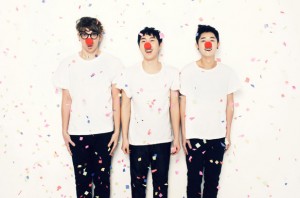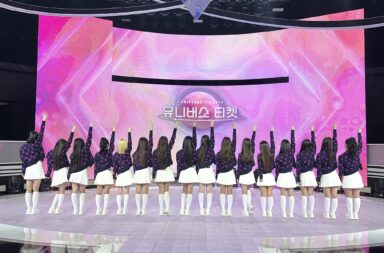 Reality singing shows are good things for the most part. They help bring up the standards of idol singing, help the talented get a platform from which to launch a career and debut their alumni like arriving buses — after supporting them on the show, we anticipate their debuts for what seems like an eternity, before they all seemingly come out at once.
Reality singing shows are good things for the most part. They help bring up the standards of idol singing, help the talented get a platform from which to launch a career and debut their alumni like arriving buses — after supporting them on the show, we anticipate their debuts for what seems like an eternity, before they all seemingly come out at once.
In the space of two to three months, we have seen contestants from SBS’s K-Pop Star and MBC’s Birth of A Great Star release singles or mini-albums within a year of their show appearances. While fast-tracked training regimes and having talent that only requires a bit of polish played a part, one could also argue that the need for a fast debut comes from having to capitalise on their current fame.
So with that, it’s worth seeing how well these contestants have done so far, as well as how they stack up to the father of Korean reality singing competition shows, MNet‘s Superstar Korea (and its various seasons). Also, despite limited promotional appearances (like how winners from K-pop Star do not promote on MBC shows, and Great Star winners do not promote on SBS), are they able to create an impact?
While MBC’s Birth of A Great Star had a largely forgettable second season, the first season was known for producing a fair number of alumni who became minor celebrities in a way. Although both David Oh and Kwon Ri-sae might not have done much commercial music material, they did enjoy substantial fame outside of music, by starring in commercials and being the subject of a fictitious marriage for television.
Still, from time to time they have still been involved in music, he with his guitar covers and her with songs for commercials.
More well-known though would be winner Baek Chung-gang, known for his Korean-Chinese citizenship and his story of being reunited with his parents after more than a decade. However, since his victory, he has kept a low profile, only releasing a digital single written by his show mentor, Boohwal’s Kim Tae-won.
That is, before he changed companies and musical styles at the same time, and then went on hiatus for surgery.
Which leaves our current man of the moment, Roh Ji-hoon, who finished fourth in the competition. In some ways, taking his time out to sign with a relatively larger company (Cube Entertainment) and polish up on the finer details of performing has done him good. Weak dancing aside (it’s pretty obvious most of his moves involve shifting from left to right and belt pulling), Cube has done rather well to sell him as a solo pop star, with his decent singing and good looks. And as long as he meets or exceeds those expectations, there should be a ready audience for performers like him.
Ready audiences were also something the Final 3 contestants of K-Pop Star could expect on their big name debuts, which were helmed by the Big 3 (SM Entertainment, YG Entertainment and JYP Entertainment) of the industry. If there is one thing that could be guaranteed about debuting with the Big 3, it is the promise of a slick and well-packaged concept, coupled with enough buzz to at least generate interest. Add to that some proven singing abilities, and not much could go wrong.
One thing though not really expected from the Big 3: speedy debuts, with all three finalists debuting within six months of the show’s conclusion. Apart from the reasons stated above, another one would be how SBS is gearing up for another season of the show this year end, and hence the need for pushing this batch of finalists.
While the three finalists all have equally high levels of singing ability and have largely maintained what made them likeable on the show’s run, their differences in terms of musical styles pursued and commercial success means they merit some comparison.
First to release a mini-album with JYP Entertainment was Baek Ah-yeon, who debuted in September as a straight-up female balladeer with the single “Sad Song”. In many ways, JYP rightfully chose to stick with her performing characteristics the way they were in the competition. This means that we enjoy most of her strengths (her smooth midrange, her emotionally packed delivery), things which are more love-hate (her pitchy high notes) and things we are not too bothered about (her not trying to dance or be hint vaguely at sexy concepts). As an alternative to idol groups, it’s not a bad one.
However, I am slightly more ambivalent about winner Park Ji-Min’s musical debut in a duo called 15&. While I did like JYP’s attempt at recreating some Davichi magic with two talented singers, as well as the aspirational theme of the song, there was that something about it that did not click for me.
Maybe it was the name (what happens when they turn 16?!), or that the song was so controlled that it got a bit too boring after a few listens, or that I ended up warming up to the other girl, Baek Ye-rin more, but I always seem to want that something more even at the end of every live performance. Still, with youth and potential on their side, there is quite a lot of time to move up and get better.
http://www.youtube.com/watch?v=piz_Rh9mbew
By far the most impressive, and so far best selling of the three debuts would have to be runner-up Lee Hi. For one, her debut song is different, and all the better for it. The soulful and slightly sassy sound is something we have not really heard in K-pop, with the same thing largely applying to her vocals. In short, it is pretty easy to understand why most seem to be buying into her “breath of fresh air”, with the song dominating charts. About the only thing that she is still lacking in would be her facial expressions on stage, but as with most rookies, these are things that are fixed with further stage experience. And to YG Entertainment’s credit, they have helped try to take the attention off that with what could be the largest crew of back up dancers.
http://www.youtube.com/watch?v=o0zi9v9-a3I&feature=plcp
In some ways, winning the competition is probably just the start of things, and that nothing is really guaranteed from winning, apart from the recording contract and prize money. Too often, there have been cases of runner ups outshining the winners, first with Superstar K3’s Busker Busker out-doing Ulala Session, then now in K-Pop Star with Lee Hi outselling (and YouTube viewing) Park Ji-Min.
 So what explains the “win the competition battle, lose the sales war” phenomenon? One factor could be how much star factor the contestants have, which is something not commonly noted during the competition. While one might be able to impress vocally in competition, and do the right things to impress viewers and judges, the same moves might not work anymore with album releases, where more charismatic contestants get a head up.
So what explains the “win the competition battle, lose the sales war” phenomenon? One factor could be how much star factor the contestants have, which is something not commonly noted during the competition. While one might be able to impress vocally in competition, and do the right things to impress viewers and judges, the same moves might not work anymore with album releases, where more charismatic contestants get a head up.
In some ways, an analogy could be drawn to school examinations and the real world, where school is the competition and the real world is post-competition album selling. Not always do the top scorers end up going the furthest when school gets over and done with.
Another reason why this happens is due to how audience votes are canvassed. A theory floated online said that while runner-ups usually have strong voting bases since the start of the show, winners also start off on the same (or slightly lower) level, but canvass votes off fanbases of already eliminated contestants, thus giving them the final push to win. While such neutral fanbases tend to disappear after the show, thus resulting in lower than expected support, the strong bases tend to stick with their biases, and help ensure continued support post show.

One more insight gained from observing reality show contestants is the possibility that holding off the debut till later might yield better results. While Roh Ji-hoon made his debut one year after Birth Of A Great Star ended, it was more than enough time for him to brush up on the finer aspects of performance (dancing excepted), as well as find a niche he could work in comfortably. The same also applied to John Park from Superstar K2, who held off debuting until he had improved his Korean and found songwriters and composers that could make the best of his talents.
If something is guaranteed about such shows, it is they will always be made to satisfy viewer demand, and that there will always be a pool of talent willing to take a shot at fame. One thing is for sure though, a good position in the show is always just the start of a very varied career, and that post-show fame is very unpredictable by nature.
(MBCkpop@YouTube.com, 100ayeon@YouTube.com, SBSMusic1@YouTube.com)


